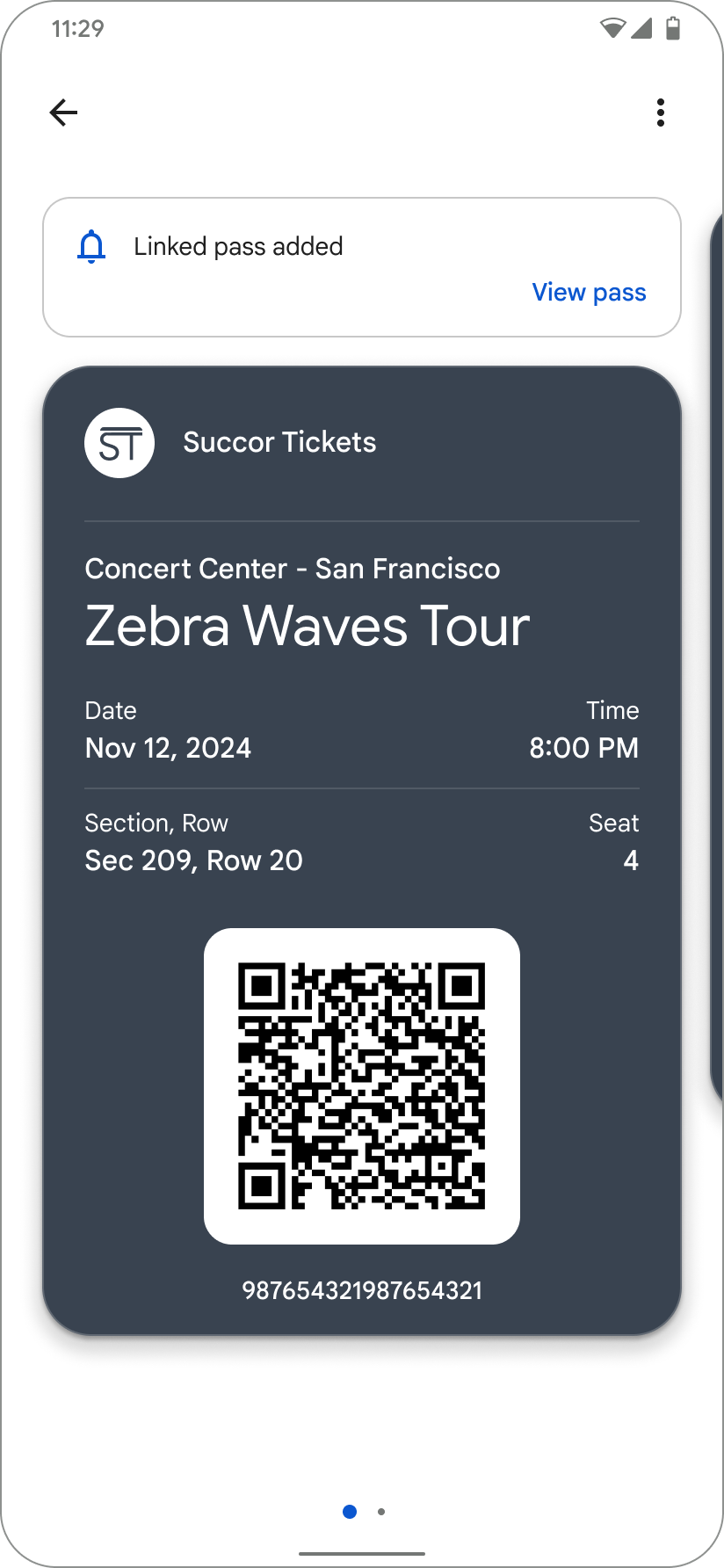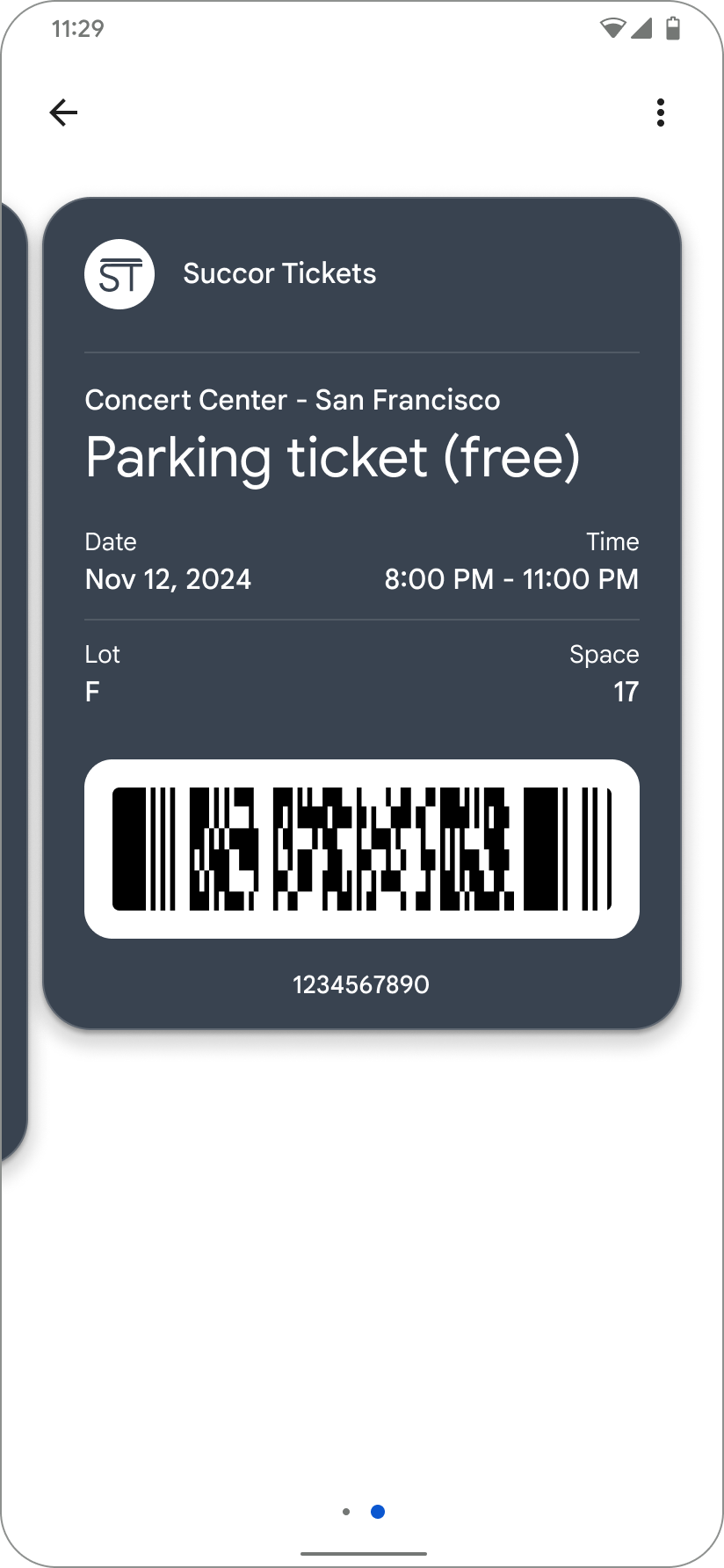背景
借助“自动关联卡券”功能,您可以向 Google 钱包中已有您发放的卡券的用户发送其他卡券。您还可以在用户保存主(主要)卡券时,预先将卡券与主卡券相关联。自动关联的卡券会与主卡券归为一组,主卡券上方会显示一条标注,告知用户已关联新卡券。以下卡券类型可作为主卡券或关联卡券;
- 活动门票
- 登机牌
- 公交卡
- 优惠
- 礼品卡
- 会员卡
- 通用卡券

|

|
| 主要通行卡,带有“已添加新卡券”的标注 | 与主卡关联的新卡 |
使用场景
您可能需要将卡券关联到现有卡券,以满足不同的使用情形。以下是一些示例:
- 将优惠与现有会员卡相关联。
- 将餐券与登机牌或活动门票相关联。
- 将停车证与活动门票相关联。
使用自动关联的卡券时的一些注意事项
- 主对象和关联对象必须使用相同的 issuerId。
- 每个主要对象的关联对象数量上限为 50 个。
- 我们无法保证自动推送关联的卡券,这属于尽力而为的范畴。用户可以选择不接收自动关联的卡券。如果使用情形非常重要,用户必须收到关联的卡券,我们建议通过其他渠道进行沟通,以确保用户添加卡券。
- Google 钱包 AUP 的更新内容包括有关使用“自动关联卡券”功能的指南,您必须遵守这些指南。
集成步骤
如果您已创建主要对象,则可以跳过第 1 步。
- 使用必需的参数创建任意列出的卡券类型的对象。这是主要对象。
- 创建所列任何类型的其他卡券对象。这将是关联的对象。
- 在保存主对象之前或之后,使用 linkedObjectIds 参数中的关联对象 ID 更新主对象。
设置主卡上的 linkedObjectIds 需要最低有效负载。3 个必需参数包括:
- ISSUERID.PRIMARY_OBJECT_ID
- ISSUERID.PRIMARY_CLASS_ID
- ISSUERID.LINKED_OBJECT_ID
用于向卡券对象添加关联对象的 JSON 请求示例
… { "id": "ISSUERID.PASS_OBJECTID", "classId": "ISSUERID.PASS_CLASSID", "barcode": { "type": "qrCode", "value": "QR code" }, "linkedObjectIds": ["ISSUERID.LINKED_PASS_OBJECTID"] } …
将对象与卡券对象相关联后的 JSON 响应示例
…
"state": "active",
"linkedObjectIds": {
"ISSUERID.LINKED_PASS_OBJECTID"
}
…预期行为
收到成功响应后,已更新卡券的设备应会收到关联的卡券。关联的卡券将与主卡券归为一组。用户可以通过向右滑动来查看关联的卡券。
异常处理
如果 API 使用不当,可能会出现以下潜在错误:
| 短信 | 原因 |
|---|---|
| 主对象和关联对象不共用同一发布者 ID。 | 您无法将关联的对象附加到其他发行方的对象。 |
| 主对象和关联对象指的是同一对象。 | 您无法附加与 linkedObject 相同的对象。 |
| 关联的对象不存在。 | 关联的对象应已插入到 Wallet API 中。 |
| 关联的对象已具有其他关联的对象。无法添加嵌套的关联对象。 | 链接的对象不能再链接其他对象。 |
| 对象已与其他对象相关联。无法添加嵌套的关联对象。 | 主对象本身不能是关联对象。 |
| 无法再添加任何关联对象,已超出限制。 | 主要通行卡已达到 50 张关联通行卡的上限。 |
